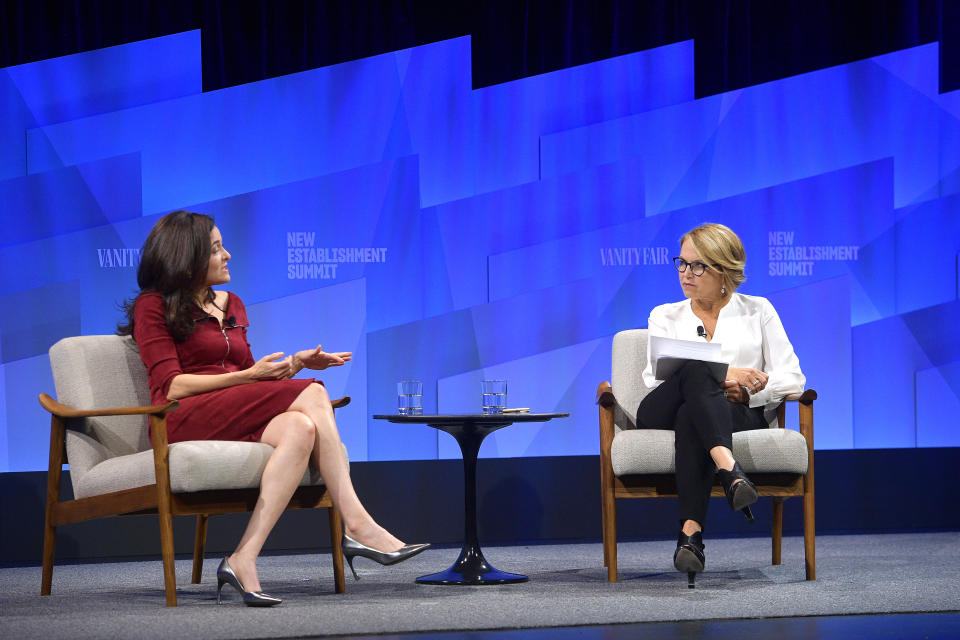Facebook's Sheryl Sandberg: We won't take down content just because it's false
As Mark Zuckerberg readies to testify before the House Financial Services Committee in D.C. on Wednesday, Facebook’s chief operating officer took the stage in Los Angeles to defend the social network’s policy of not fact-checking political ads.
Sheryl Sandberg acknowledged the company continues to allow for factually inaccurate posts to continue to proliferate on the site, but says that they aren’t distributed as widely if they are flagged as “false.”
“When we have misinformation...unless it’s hate that will lead to real world violence, we need to let the debate continue. We don’t want things to go viral, we mark those as false, and it dramatically reduces sharing. If it’s hate — if someone really shows up to the polls on the wrong day, we need to take it down,” she said at the Vanity Fair New Establishment Summit Los Angeles on Tuesday afternoon.
‘There were certainly disagreements over Mark’s speech’
Sandberg’s comments came after Zuckerberg defended allowing politicians to lie in their ads at a speech during Georgetown University’s “Democracy in a Digital Age” event last week. His comments sparked criticism, including from Democratic presidential front-runners Joe Biden and Elizabeth Warren, the latter of whom accused Facebook of actively helping President Donald Trump spread lies.

“There were certainly disagreements over Mark’s speech,” Sandberg said. “The transparency is dramatically different this time around. You can see the origin of where a person is. If you look at our ad library we didn’t have this [in 2016]. You can see any political ad anywhere in the country even if they’re not targeting you. Now you can see everything. Yesterday, we launched a presidential ad tracker so you can see the campaigns much more holistically.”
Echoing Zuckerberg’s rationale, she said, “We take political ads because we believe they’re part of political discourse. If you look at it over time, the people who benefit from running ads are those who aren’t covered by mainstream media, people who have different points of view, and those who aren’t incumbents.”
“But we’ve taken much stronger steps on hate, looked at white nationalism, separatism, and we’ve really come down on a strong policy of voter suppression, which we’re considering as hate,” she added.
Facebook does not allow hate speech, terrorism, violence, bullying, and voter suppression, but Zuckerberg and Sandberg believe that blatant lies in political ads or posts about a news event are not as toxic.

“We have a very strong free expression bent. If something is false, we don’t take it down. We send it to third party fact checkers. We dramatically decrease distribution — to about 20% — and we show related articles. The challenges of scale here are really important. A lot of the areas we’re reluctant to weigh in on is because we know we can’t do this well at scale,” she said.
Sandberg, who has been Facebook’s COO for 11 and a half years, said her role has dramatically shifted — instead of a focus on growth, it’s about curbing bad actors, which could be at odds with Facebook’s advertising-dependent business model.
‘It is whack-a-mole’
At one point, interviewer Katie Couric questioned Sandberg about how 30,000 human content moderators could possibly manage the millions of bad content being posted every single day.
“Our job is to build technology to take things down as quickly as possible. It is whack-a-mole but it is the price of free speech...and we see all the beauty and all the ugly of humanity,” said Sandberg.
With 2.7 billion people using Facebook, Instagram or Whatsapp once a month, would the only possibility to clean up bad actors to be to shut down the website entirely?
“Our job is to get as much of it down as possible. I don’t think the temporary shut down will solve the problem,” Sandberg said.
Fifty-two percent of adults in the U.S. get their news from Facebook, but Sandberg still doubles down on the narrative that Facebook isn’t a media company. “We’re a technology company — a lot of things are published on us. We’re not a publisher in a traditional sense because we don’t have editors that are fact-checking. We are taking responsibility. It’s not perfect but we had no policies against this in the last election. You fast forward today and we’re in an imperfect but much better situation,” she added.
When asked about whether the problems plaguing Facebook will stain her legacy, Sandberg said, “I have a really big responsibility here for a company that I love and believe in. There are a lot of problems to fix — they’re real and I have a real responsibility. But I feel more committed and energized than ever. Because I want to fight to preserve the good.”
Melody Hahm is a senior correspondent at Yahoo Finance, covering entrepreneurship, technology and culture. Follow her on Twitter @melodyhahm.
Read more:
